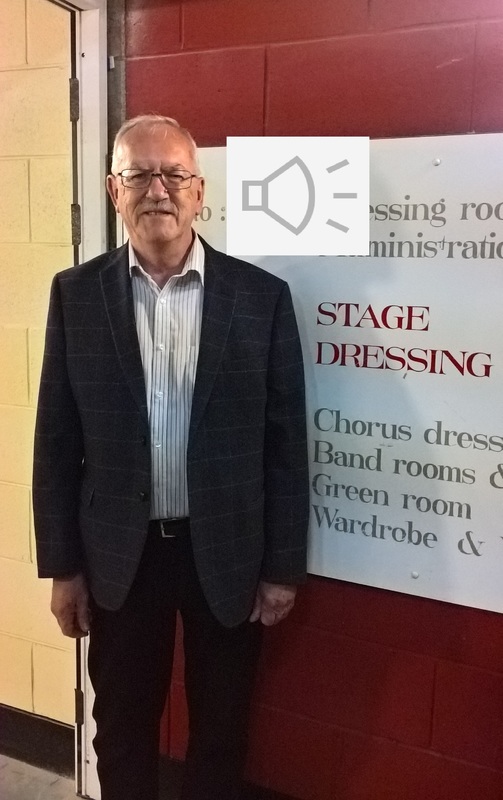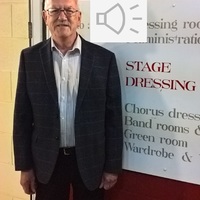Title
Richard Berry Interview: Dealing with Artists, Visitors & Fans
Date
12 September 2017
Description
Oral history interview with Richard 'Dick' Berry, Stage Door Keeper at the Theatre Royal for nineteen years from 1992 to 2011.
What's the story?
Richard Berry, known simply as ‘Dick’ by all staff, artists and visitors was a long-serving Stage Door Keeper from 1992 to 2011.
Born in Nottingham in 1946, Dick had a few jobs prior to working at the Theatre Royal, including a long stint as a milkman.
Dick always had a friendly welcome for all visitors and his jokes and sense of humour were notorious. This is still very much evident in these interviews.
In this interview Dick talks about the various types of people he would encounter at Stage Door and how to deal with them. This ranges from singer James Taylor to West Indian cricketer Gordon Greenidge, as well as fans of boy bands:
Well, in the early days they didn’t. They just used to come to the stage door and ask for a dressing room, which, we didn’t allocate dressing rooms. That was the Company Manager used to come in and he’d allocate which dressing rooms were which. So he’d bring me the list and they’d come in and I’d just give them the key to the dressing room. What I tended to do was, if I didn’t know somebody who was coming in, I’d try and find a photo: I’d try and see what they looked like.
You know, the biggest shock I got was James Taylor. I didn’t recognise him at all. He looked like a schoolteacher. When he walked in he’d got the tweed jacket on with the leather elbows. That was a bit difficult. But we’d got the cast list and you’d get odd people turn up at the stage door who you didn’t know. I had a guy one day and I sort of recognised him, but I wasn’t sure. He was coming from Clarendon College and I suddenly realised, being a cricket fan, that it was Gordon Greenidge. He was a West Indian opening batsman. He was a bit of a hero bloke for me. You’d get odd people come in, but most times we’d got the cast list, so we knew all the cast members and if you didn’t, obviously the lower down the cast we didn’t know: and they’d just introduce themselves.
I stopped everybody. When I came, when I first started, the Managing Director, Mike Grayson, he was on holiday and when I knew he was coming back from holiday, I stopped him. I stopped him at the Stage Door. I knew who he was but I just stopped him. He said to me “I’m Mike Grayson” and I said “I know you are, but I thought I’d have to stop you because you don’t know me and I don’t know you”. So I just stopped people coming in. It got difficult later because of people trying to sneak in. For some reason – I don’t know why they wanted to but obviously to steal, I should think.
But we had some horrible nights when East 17 were here. When the Boy Band revolution came round, it got terrible with the young girls. I wouldn’t like to repeat – you should have seen what sort of notes I put through that door. Obviously some artists went out the front. Marti Pellow – I never saw him go out at night. He used to go in his dressing room, put a coat and cap on and walk out the front, with the audience. Just used to walk out with them. Nobody noticed him. And then obviously you get the people who don’t believe they’ve gone. They stand at the Stage Door and I tell them they’ve gone. Even people who know me as I say they’ve gone, say “Oh Alright…” and I’d say “Well wait”. In fact one night, I think K D Lang was on, and I locked up. I locked the door and went “Well I’m off” and there were about ten people still outside.
Born in Nottingham in 1946, Dick had a few jobs prior to working at the Theatre Royal, including a long stint as a milkman.
Dick always had a friendly welcome for all visitors and his jokes and sense of humour were notorious. This is still very much evident in these interviews.
In this interview Dick talks about the various types of people he would encounter at Stage Door and how to deal with them. This ranges from singer James Taylor to West Indian cricketer Gordon Greenidge, as well as fans of boy bands:
Well, in the early days they didn’t. They just used to come to the stage door and ask for a dressing room, which, we didn’t allocate dressing rooms. That was the Company Manager used to come in and he’d allocate which dressing rooms were which. So he’d bring me the list and they’d come in and I’d just give them the key to the dressing room. What I tended to do was, if I didn’t know somebody who was coming in, I’d try and find a photo: I’d try and see what they looked like.
You know, the biggest shock I got was James Taylor. I didn’t recognise him at all. He looked like a schoolteacher. When he walked in he’d got the tweed jacket on with the leather elbows. That was a bit difficult. But we’d got the cast list and you’d get odd people turn up at the stage door who you didn’t know. I had a guy one day and I sort of recognised him, but I wasn’t sure. He was coming from Clarendon College and I suddenly realised, being a cricket fan, that it was Gordon Greenidge. He was a West Indian opening batsman. He was a bit of a hero bloke for me. You’d get odd people come in, but most times we’d got the cast list, so we knew all the cast members and if you didn’t, obviously the lower down the cast we didn’t know: and they’d just introduce themselves.
I stopped everybody. When I came, when I first started, the Managing Director, Mike Grayson, he was on holiday and when I knew he was coming back from holiday, I stopped him. I stopped him at the Stage Door. I knew who he was but I just stopped him. He said to me “I’m Mike Grayson” and I said “I know you are, but I thought I’d have to stop you because you don’t know me and I don’t know you”. So I just stopped people coming in. It got difficult later because of people trying to sneak in. For some reason – I don’t know why they wanted to but obviously to steal, I should think.
But we had some horrible nights when East 17 were here. When the Boy Band revolution came round, it got terrible with the young girls. I wouldn’t like to repeat – you should have seen what sort of notes I put through that door. Obviously some artists went out the front. Marti Pellow – I never saw him go out at night. He used to go in his dressing room, put a coat and cap on and walk out the front, with the audience. Just used to walk out with them. Nobody noticed him. And then obviously you get the people who don’t believe they’ve gone. They stand at the Stage Door and I tell them they’ve gone. Even people who know me as I say they’ve gone, say “Oh Alright…” and I’d say “Well wait”. In fact one night, I think K D Lang was on, and I locked up. I locked the door and went “Well I’m off” and there were about ten people still outside.
Type
Oral interview
Location of item
Theatre Royal & Royal Concert Hall Nottingham
Rights
Theatre Royal & Royal Concert Hall Nottingham
Contributor
Interviewers: Diane Jones & Jennifer Sherwood
Transcriber: David Chilton
Transcriber: David Chilton

